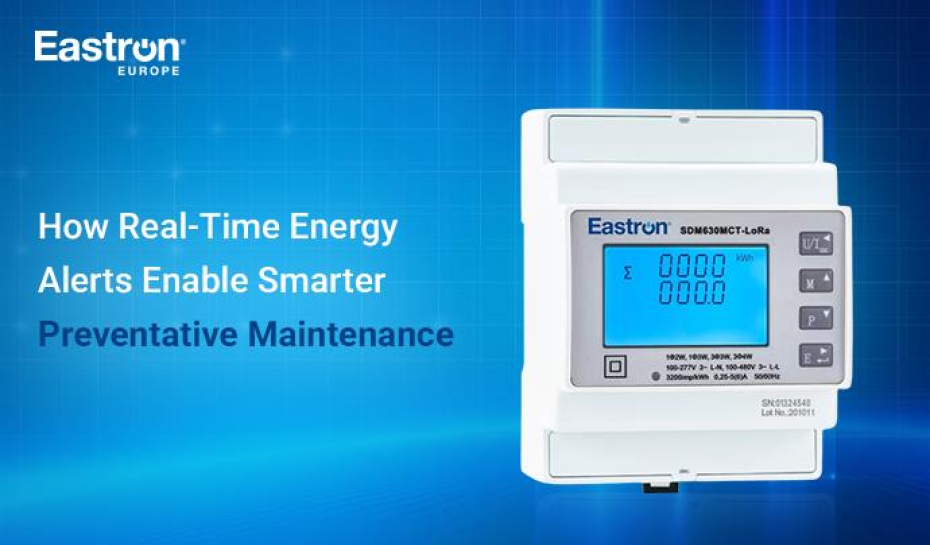
Smarter Maintenance Starts with Real-Time Energy Alerts: A Guide to Predictive Efficiency
Preventative maintenance is evolving, and at the heart of this transformation is real-time energy monitoring. In industrial and commercial environments, early warnings from energy data can prevent costly downtime, reduce maintenance costs, and optimise operational efficiency. This blog explores how real-time alerts identify anomalies before they escalate and enable smarter decision-making, especially when combined with wireless monitoring systems and DIN rail-mounted smart meter monitors.
The Role of Real-Time Monitoring in Preventive Maintenance
Real-time energy monitoring provides instant insight into electrical performance, helping maintenance teams detect irregular patterns, overloads, or inefficiencies before they become critical issues.
Why Real-Time Data Matters Here
Without real-time visibility, maintenance becomes reactive instead of proactive. Live monitoring allows for:
- Immediate anomaly detection: Spot voltage drops or current surges instantly.
- Predictive scheduling: Schedule maintenance based on usage trends, not guesswork.
- Energy trend analysis: Identify inefficiencies in specific machines or time blocks.
Downtime prevention: Address small issues before they escalate into failures.
Wireless Monitoring Devices: The Backbone of Smart Alerts
Wireless devices make real-time energy monitoring simpler and more scalable. With fewer infrastructure constraints, businesses can deploy monitoring systems across facilities quickly.
Advantages of Real-Time Energy Alerts for Facility Managers
Energy alerts provide timely signals, enabling facility managers to take action quickly without manual intervention.
Key Benefits of Real-Time Energy Alerts
- Faster fault identification – Get notified when energy use deviates from normal patterns.
- Improved asset lifespan – Consistent monitoring prevents overuse and strain on machinery.
- Compliance tracking – Stay aligned with energy regulations through consistent data tracking.
- Resource optimisation – Allocate maintenance resources only when needed.
- Reduced manual inspections – Alerts remove the need for constant equipment checks.
The Importance of Wireless Energy Meters in Industrial Monitoring
Wireless energy meters transform industrial energy management by eliminating the need for hardwired infrastructure while offering instant, location-agnostic insights.
Some of the benefits are:
- Cable-free installation – No need for complex wiring or retrofitting.
- Remote real-time updates – Monitor energy status from any device, anywhere.
- Scalable deployment – Easily expand monitoring across multiple sites or buildings.
- Seamless integration – Connects with cloud platforms and alert systems for automated maintenance triggers.
- Energy-efficient logging – Optimised for long-term use without frequent intervention.
Eastron Europe's wireless remote monitoring systems with data loggers for energy offer a smart, future-ready alternative to traditional setups. This makes predictive maintenance possible and practical across complex industrial environments.
Creating a Preventive Maintenance Strategy with Energy Monitoring
A well-integrated system transforms maintenance from manual routines to data-driven operations.
Steps to Build an Effective Strategy
- Install smart meters at critical points – Start with high-load equipment.
- Use wireless data loggers – Ensure data is collected consistently.
- Define energy thresholds – Set clear parameters for alert triggers.
- Automate alert workflows – Integrate with maintenance scheduling platforms.
- Analyse data weekly – Review performance trends to predict faults.
Conclusion
Preventive maintenance is no longer about guesswork but data, visibility, and precision. With the rise of real-time energy monitoring and wireless alert systems, facility managers can respond to potential failures before they occur. Metering devices like Eastron Europe's wireless monitoring systems and DIN rail smart meters provide a dependable framework for operational efficiency, compliance, and cost savings.
As more businesses shift towards predictive models, now is the time to embrace real-time alerts and evolve your maintenance strategy.
